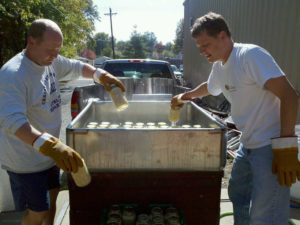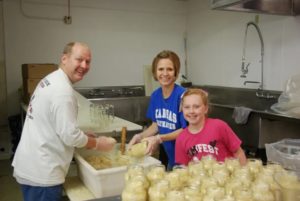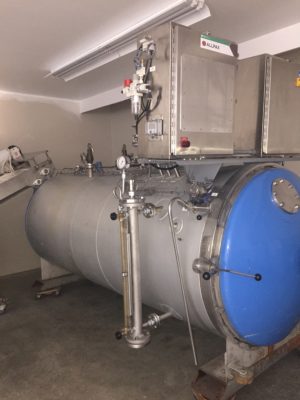Kansas clan turns old family sauerkraut recipe into budding regional food producer
Ray Rome, the patriarch of the Rome family, began gifting homemade Bavarian-style sauerkraut in the mid-1980s. He followed the Rome family recipe passed down through the generations: sliced cabbage, salt and water allowed to ferment naturally, while maintaining a stable temperature and acidity level.
With Ray’s retirement looming post-2010, the enticing prospect of a part-time sauerkraut business for Ray, his wife and the couples’ four grown children, proved enticing based on the popularity of the product.
Hoganville Family Farms in Olathe, Kansas, commenced its first commercial production run in 2011. In a rented kitchen under the watchful eye of a state inspector, the cores were removed from “kraut” cabbage and the leaves sliced by the company’s vintage hand-fed Hobart slicer. The sliced cabbage leaves were placed in vats, water and salt added, and the ingredients left to naturally ferment for two weeks.

Adding vinegar to the brine would have sped up fermentation, but that was not the Rome family way. Following fermentation, the sauerkraut was hand-packed in various sized glass jars for consumers and commercial accounts. The jars were then placed in a water bath until heated to an internal temperature of 165°F, making the sauerkraut safe for long-term on-the-shelf storage. All the jars were hand-labeled. Manually lowering and lifting trays of jars into and out of a hot-water-bath made for long demanding days.
The first year the family produced a 1,500-pound test run. Family members became annual sauerkraut evangelists, selling product through farmers’ markets, fairs, restaurants, as well as giving out samples at grocery stores. A decade later, annual output has reached 100,000 pounds.
All four children have day jobs and live outside the area. Yet each fall, they travel home for the slicing, fermenting, packing, canning and labeling operation. The company now has its own building and seasonally employs about 25 people. The kraut cabbage is sourced from various growers. Today, the fermented sauerkraut is hand packed primarily in 12- and 24-ounce glass jars with larger size containers going to commercial accounts.

Hoganville Family Farms sauerkraut is sold primarily in Kansas, Nebraska and Missouri. Stores currently carrying Hoganville Family Farms’ products include Whole Foods, Green Acres, Hy-Vee, Price Choppers, Dillons Food Stores, Natural Grocers and many independent meat markets too numerous to mention individually by name.
There is an extraordinary amount of research and discussion among family members in the off season about the need for equipment, staffing and marketing. Equipment purchase decisions are made with great deliberation that can extend to a year or more.
To the next level
Several years ago, it became apparent that 100,000 pounds of product was approaching the upper limit of the company’s manually based production practices. There was an issue of floor space — simply not enough room to add staff and equipment. Even if space were found for more employees and equipment, the cost/benefit ratio of an incremental boost in manually based production would be unfavorable.
Then there was the issue of packaging. As a small seasonal company, access to a steady supply of preferred jars was problematic. Securing jars with the same look and feel meant Hoganville had to purchase several seasons of containers ahead, which presented capital investment, storage and handling issues.
It became clear that to grow meant to automate the packing and sterilization process to cost effectively maximize production in the available space. The family began to re-envision its production process. A move to flexible packaging seemed to offer a solution to the glass jar issues. According to the Flexographic Technical Association (FTA), one truckload of flexible packaging is equivalent to 15 to 25 truckloads of rigid containers. With flexibles, in-bound transportation costs would diminish, the unit cost per package would fall and preprinting would simplify labeling.
While the family was certain about the benefits from the switch from glass to flexibles, the type of flexible packaging still had to be decided. The family researched and discussed three options: form-fill-seal, lay flat bag and standup gusseted pouch. After reaching out to numerous suppliers, Hoganville Family Farms decided on pre-printed pre-made gusseted pouches. The standup pouches would differentiate Hoganville sauerkraut from competitive products packaged in lay flat bags. Standup pouches in 16- and 32-ounce sizes would make a bold visual statement, especially with a window to display the natural product with its distinctive light gold color. After a thorough search for the optimum machine, the company purchased a used WeighPack integrated weigh scale/filler/sealer unit.
Once the pouches were filled and sealed, then what? The logical answer was to purchase a batch retort, which would eliminate the slowest step in the packaging process — water-bath sterilization — and transform it into the fastest step.
Diving into the technology, the family learned that retorts are manufactured for particular sterilization processes which are optimized for specific types of packaging and products. The most common retorts available in the U.S. are based on steam sterilization used for cans and not suitable for pouches, trays, and plastic bottles. For flexible packaging, an overpressure retort is required. Overpressure retorts include water immersion, water spray/steam air, or forced steam/air with fan.
“Overpressure processes maintain the integrity of the pouch and other flexibles by preventing the gas and liquids within from overexpansion that could potentially burst the package,” said David Cohen, Allpax Lead Software Engineer. Experts at Allpax, a leader in batch retort and retort room automation.
Another Allpax staffer, Chris Barbier, a technical sales consultant, added that using retorts, the vessel Hoganville was considering, would simply be a shell stripped of controls prior to sale as controls typically contain proprietary information. Retort shells can be carbon or stainless steel and both metals are prone to corrosion in retort applications. Barbier advised that ensuring the integrity of the shell prior to purchase would be a must.
“Companies must also take into account the need to purchase a boiler and have the water inflow and outflow capacity required by the sterilization process,” he said.
 A 1984 vintage overpressure retort turned up in the aftermarket. This 1,100 mm circumference three-basket unit, originally used in test marketing of shelf-stable products, was an ideal size for Hoganville production requirements in terms of capacity, throughput and compact footprint. Hoganville purchased it, and a family member collected it via flatbed truck in Mississippi and delivered it to the Allpax plant in Louisiana, where the retort would be refurbished.
A 1984 vintage overpressure retort turned up in the aftermarket. This 1,100 mm circumference three-basket unit, originally used in test marketing of shelf-stable products, was an ideal size for Hoganville production requirements in terms of capacity, throughput and compact footprint. Hoganville purchased it, and a family member collected it via flatbed truck in Mississippi and delivered it to the Allpax plant in Louisiana, where the retort would be refurbished.
An Allpax project manager was assigned to the refurbishment and kept Hoganville appraised of the status during the four-month modernization upgrade. The shell was sandblasted until its stainless-steel shell gleamed like new. Automated valves, seals, and all the other parts were inspected and replaced as needed. A state-of-the-art Rockwell Automation PLC with Allpax FDA compliant software was installed. The Allpax software sequences retort operation for each sterilization recipe and records process data for every batch. Electronic record keeping conforms to Food Safety Modernization Act guidelines. This software is identical to that found in the largest and most advanced retort operations in the world. Even though used, the refurbished retort is basically new. The family estimates it saved 50 to 60% of the cost of a comparable new unit.
The COVID-19 pandemic set the company back at least a year in its automation implementation. Premade pouches of Hoganville Family Farms sauerkraut should be widely available in 2022. Ramping up from 100,000 pounds of product per year to 500,000 will be made in stages. Concurrent with the increase in production, Hoganville will use its greater output to expand sales through wholesale distribution.
While automation is going to take Hoganville Family Farms to its next level of business development, some things will not be changing. Hoganville will remain an intensely family-oriented company where Ray and his grown children will continue working hand in hand, where the memories of home canning and gifting jars of sauerkraut will remain strong, and where the natural recipe handed down through generations will be lovingly followed every fall following the cabbage harvest.
— Jeff Rome is the co-owner of Hoganville Family Farms in Olathe, Kansas (www.hoganvillefamilyfarms.com).







